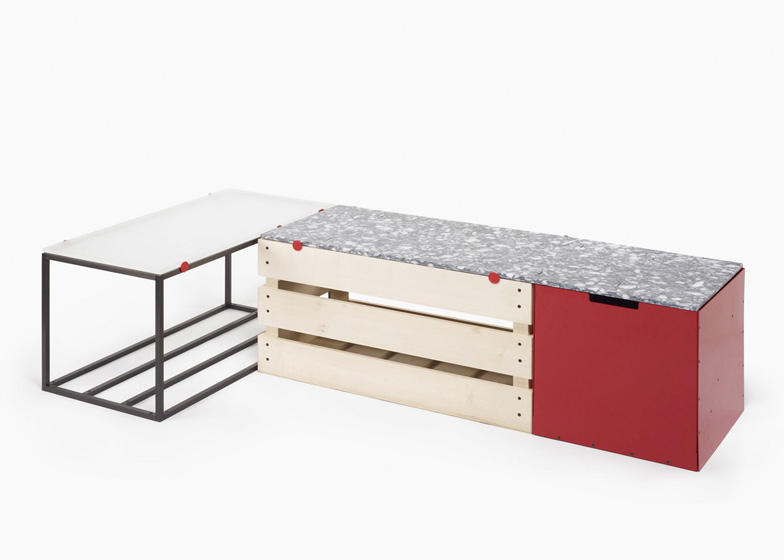ECAL graduate Su Jung-Cheng has designed a collection of boxes and flat surfaces that clip together to make stools, shelves or whatever's needed at the time.
The Nonsystem collection comprises five elements in different materials that can be fixed to each other using small red tabs.
Su Jung-Cheng came up with the design after thinking about how homeless people build beds and furniture from boxes and pieces of cardboard.
The red box and the black frame are made from aluminium and the crate is made from maple, while the two flat surface pieces are made of Plexiglas and recycled plastic.
The pieces are designed to be multi-functional, says the designer. "For example, a box is the minimal element for storage, but if you turn the box it could also serve as a stool," she told Dezeen.
"I chose not to define much about the function so that you can always leave it open to any kind of function," she added.
The design is currently a prototype but Jung-Cheng hopes to put it into production soon.
Jung-Cheng completed her bachelor's degree in Taiwan before graduating from the Product Design master's course at Ecole Cantonale d’art de Lausanne (ECAL) in Switzerland this year, where Nonsystem was her final project.
Other adaptable furniture we've featured on Dezeen includes a set of chairs that can be swapped around in their bathtub-shaped base and a storage design that uses sliding rods for its shelves.
See all our stories about storage »
See all our stories furniture »
Here's some more information from the designer:
Nonsystem is a system furniture or not a system furniture.
It was inspired by an image that shows a homeless person building his bed with two storage boxes and chipboard. I was very fascinated by this minimalist style. So I created this boxes furniture collection to cope with all changes by remaining unchanged.
This transforming furniture system consists of five various elements that can be adjusted to a user's needs. Made from aluminum, maple wood, Plexiglas and recycled plastic, the collection can be playfully mixed and matched.
It is a research of function and material. While designing these boxes, I learned to treat different materials in different ways.
The final result gives a look almost like a collage of materials and colors. And what makes them look coherent is only by their dimension. So each piece can be regard as an individual object but also part of the system.
"Random is measurable"
"La mathematique est l'art de donner le meme nom a des choses differentes."
(Mathematics is the art of giving the same name to different things.)
Henri Poincare

